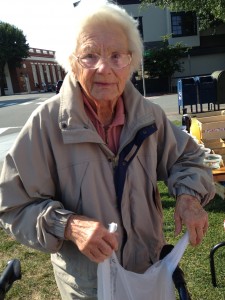|
|
December 31, 2013
 I have no family. I don’t belong anywhere. Last day of the year and I’m settling in with a bowl of raisin oatmeal and a mug of vanilla black tea (Thank you, Trader Joe’s, and could you please carry this stuff year round?) I’m ready to write a pithy blog about looking back at lessons learned in the old year and setting goals for the new, when I get this email from a 16 year old who just found out he was adopted:
“Everything I knew about my family is a lie. My sisters aren’t my siblings. My mom and dad aren’t my mom and dad. My real mom abandoned me in a public toilet when I was a week old and my real dad was a violent criminal. My real mom didn’t even want me! So where does that leave me? I look at these people I’ve been living with and I just see two adults and two kids. I don’t belong here. I have no family. I don’t belong anywhere. I don’t know what to do.” – What now??
Dear What now?
Woah, this is a terrible shock! You probably feel like your world’s exploded and all the pieces have suddenly vanished. No wonder you’re so upset right now. I totally get it.
Writing to me was a smart move. No way should you try to figure this out on your own. It’s way too much. I’m going to do my best to help you. Here goes:
First please stop everything and breathe. Seriously. Right here at the computer. Take your hands off the keyboard and rest them lightly on your thighs. Relax your arms, your wrists, your fingers. Now inhale s-l-o-w-l-y and evenly through your nose. Then relax your jaw, let your mouth drop open and exhale s-l-o-w-l-y and evenly. Repeat this 4 or 5 times. In through your nose and out through your mouth. Slowly. (You can close your eyes if you like.) Breathing this way will help calm you down any time you need to de-stress and think more clearly. And right now you especially need it. So breathe.
OK. Ready for next steps?
Please answer this question: Before you found out you were adopted, what was your relationship your parents and your sisters like? If you’re not sure how to describe it, think about all the years you’ve had together and how you’ve felt being part of this family. Breathe while you remember times with your family… birthdays, holidays, school events, vacations, silly times, quiet times, times when you were sick, times when you were scared, times you were filled with excitement or needed comfort, etc. Let yourself remember.
In your email, you say your “real” mom didn’t want you. Sounds like you’re a bit confused between a biological mom and a real mom. They are not always the same thing. On the biological side, pretty much any dude and any woman can produce a baby. But being a real parent takes so much more. A real parent needs a loving and forgiving heart, infinite patience and a life-long unwavering commitment to a child. It’s a forever relationship where the parent’s #1 priority is the health and well-being of his or her child. There is nothing more “real” than that.
You say, “I don’t belong anywhere.” I understand why you’re feeling this way. You’re upset that you were lied to. You feel hurt and angry and you’re very confused about what all this means. But I’ve gotta disagree that you “don’t belong anywhere.” You belong just where you are, with your real parents in your real family. So, who are your “real” parents? The two people who went looking for you, found you, chose you then stepped up, made the commitment and have continued loving you and caring for you for sixteen years. That’s who I think earns the title of “My Real Parents.”
What do you think?
In friendship,
Annie
PS This is a really hard time for you and everyone in your family. Please talk to your parents about what you’re thinking and feeling about all of this. You have lots of questions and lots of emotions. There are things you need to know. So talk together and listen to each other. If it feels like you’re stuck, then reach out to a counselor at school or a family therapist in your community. You and your family can get through this. I know you can.

December 20, 2013
I’m mentoring a teen who suddenly had to step up and take care of a young sibling after their parents’ death. It’s gotten me thinking about what every child needs and deserves in order to grow into a healthy young adult.
 To give them what they need, you have to know what they need Here’s what I know: Children need to feel safe, physically and emotionally. Children need at least one person who actively cares for and parents them in the best sense of the word. Children need to feel wanted and loved so they can learn about love. They need to be treated with respect so they can learn to value themselves and the people around them. They need to feel cherished for their uniqueness so they can accept themselves and others whole-heartedly. All children need opportunities to expand their mind and their abilities through exposure to the natural world and the world of ideas. They need time for unstructured play. They need ethical guidance to understand how we are all connected and why our choices matter. Children need encouragement to use their power for good and adult models who walk the talk.
What else do you think children need?

December 17, 2013
Excerpted from my book, Teaching Kids to Be Good People.
 A no-tech solution to connection addiction While we’re all moving in ten directions at once, online and off, the notion of evenings and weekends where parents and kids spend unplugged time together is laughably retro. But life is neither virtual nor infinite. We’ve got to create an antidote to 21st century craziness otherwise our kids will grow up without us really knowing them and without them knowing us.
Listening (the old- fashioned way) with open eyes, mind, and heart is the best way we connect with our kids, and teach them how to connect with others. That’s what we want from them and for them. They need it now while they’re still learning about healthy relationships from us, so they can use it later when they’re creating intimate relationships of their own.
How do we teach them that the people we care about aren’t just on Facebook and Twitter, they’re right here in the real world and they deserve our attention?
Fuel for Thought—Think about a relationship you have where the other person is often “distracted.” What’s it like being with him/her? Contrast that with someone who is normally “there” with you. Now think about the level of “there-ness” you give to your family. Set a goal for the next week: Do a better job being with your family when you’re actually with them. Do not allow distractions to get in the way. Observe what happens.
Conversations That Count—Talk with your partner and child(ten) about digital distractions, including phones, games, TV shows, and computers. Ask them to rate the family (on a 1–10 scale) regarding the presence of distractions while people are talking to each other.
(Scoring scale: 1 = When we talk to each other, we’re not doing anything else; 10 = When we talk to each other there’s always a “distraction” present.)
Your 21st century child may not even have noticed or considered these “distractions” as anything other than “normal.” Ask what s/he thinks family life (vis-à-vis “distractions”) might look like when s/he’s grown up with their own family.
Teach—Create an Unplugging Challenge. Start small and doable. For example, “On Saturday from 4:00–5:00 p.m. we’re unplugging for an hour to do something fun, together, as a family.” Be ready for pushback from tweens/teens. Remind them it’s only for one hour. “Surely you guys can last 60 minutes w/o FB?!” “Yeah, of course we can, but we don’t want to!!!” The more resistance, the more likely your kids have a connection addiction. But don’t cave. Be upbeat. Take suggestions for a non-tech activity the family can do together for that short time. Play a board game, card game, make popcorn, build something, cook something, bake something, create something, take a walk, go for a bike ride, have an impromptu meal outside, read aloud from a mystery book, look at old family photos and tell stories. Etc. etc. Be together. Focus on each other. Have fun. Repeat often. Appreciate being a family. It’s the best gift there is during any season.

December 13, 2013
 We’re here to help, not judge Man, it’s been beyond chilly in California. (Mid-westerners, no snide chuckles, please. I don’t care what your definition of winter is, 23 degrees is cold.) But still, I’m into this. I love watching the dogs romping in the 5 pm sunset over at the park. I love making soup and lighting candles in my living room now packed with plants wintering inside. I love how business meetings get pushed off til January and that most people are down-shifting to a family-oriented gear. With our first grandchild on the way, I’m thinking more about the chain of love, life and the power we have, generation to generation… to teach kids to be kind, compassionate and open-minded. To help you do that, here’s an excerpt from my parenting book, Teaching Kids to Be Good People.
We assume we know so much more about other folks than we actually do. Teaching kids to be good people includes helping them understand how biases get in the way of knowing who people really are, what they need, and how we can help them (because that’s what we’re here for.)
From the We’re on This Speck Together file comes some food for thought from Carl Sagan: “For small creatures such as we, the vastness is bearable only through love.” Think back to middle or high school. What did your peers assume about you that wasn’t true? How do imagine those assumptions affected people’s relationships with you? Think about a former classmate who had a certain “reputation” which led you to have certain assumptions about him/her. How did your assumptions color your behavior toward that person?
• Talk with your child(ren) about the concept of the “judge” within us who rates other people mostly in terms of what we like/admire about them and what we don’t. Discuss how unfair it can feel to be judged, especially when the “judges” don’t really know us.
• Make a pledge to monitor your “judgmental” thoughts more carefully between now and New Year’s Day. Try to catch those critical thoughts before they become words. Each time we let The Judge put someone down, we stack another brick in the wall of misunderstanding. With less judging, we get to know each other better. Let’s teach kids to build bridges, not walls.

| |















